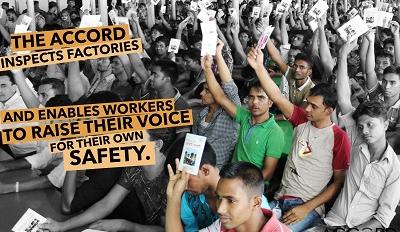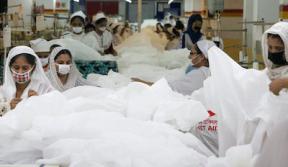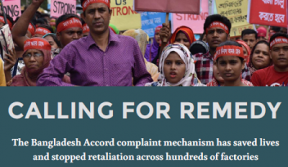
The safety program that has been instrumental in restoring international trust in its garment industry after the deadly Rana Plaza collapse of 2013 risks being expelled from the country without a credible alternative in place. Negotiations between signatories of the Bangladesh Accord on Fire and Building Safety and the government of Bangladesh have grounded to a halt, as Bangladeshi authorities have thus far refused to accept any other outcome than a swift and unconditional handover of the Accord’s tasks to national inspection entities.
Recent media reports in the Bangladeshi press suggest that factory owners and the authorities are insisting the Accord should transition its tasks to a national inspection body by a fixed date and accepting no conditions on the readiness of that body to carry out those tasks. If so, the government of Bangladesh willfully risks reversing the significant advances made on factory safety and trust in its garment industry.
As witness signatories to the Accord, Clean Clothes Campaign, International Labor Rights Forum, Maquila Solidarity Network and Worker Rights Consortium support the eventual transition of Accord inspection tasks to Bangladesh’s national inspection bodies, collaborating through the Remediation Coordination Cell (RCC). Yet, such procedures must be made conditional on concrete readiness criteria, as formulated and overseen by the International Labour Organization.
There is wide agreement and ample evidence that Bangladeshi inspection bodies do not yet have the capacity to oversee the almost 1600 Accord-covered factories, in addition to their existing task of remediating hundreds of factories currently under their purview with remediation levels that lag far behind those of Accord factories. Nor do they have a demonstrable track record of enforcing safety standards. Bangladeshi authorities have also not presented any viable alternatives for worker safety training and the worker complaint mechanism offered by the Accord.
If a time-bound expulsion would be ordered, this would leave the Accord no other choice than to start operating solely from its headquarters in Amsterdam in order to safeguard the program’s hard-won credibility and effectiveness. As a legally-binding agreement between brands and trade unions, the Accord’s mandate remains valid until 2021, and signatory brands cannot withdraw from the program before having fulfilled all their obligations.
Functioning from outside Bangladesh would maintain the program’s independence, but would come at a high price. The Accord would continue to deliver some protection to workers by using international engineering firms, and sending inspectors to the country. But without permanent engineers on the ground, the Accord would face serious limitations to its ability to monitor and verify remediation progress at Accord-covered factories.
The Accord’s Chief Safety Inspector has announced that in the event of a move to Amsterdam, he would be forced to declare hundreds of poorly performing factories ineligible to sell product to any of the Accord’s 192 signatory brands. Because the program would no longer be able to provide necessary help to complete life-saving renovations in a timely fashion, it could therefore not assure signatories that these factories are safe sourcing destinations.
Such a situation – in which brands would lose suppliers, factories would lose buyers, workers would lose jobs and factories would become more unsafe – benefits no one: not the brands, not the government, not the factory owners, and least of all the workers. We therefore call for a political solution to make a genuine transition based on real readiness criteria and solutions for all the Accord’s vital tasks possible.
There has been widespread international support for the unfettered continuation of the Accord’s work until national inspection bodies are judged ready to assume that role. This week, 190 investors representing 3.1 trillion USD in assets under management clearly expressed their support for a conditional transition with sufficient time for the national inspection body to meet the necessary conditions to be able to carry out the Accord’s work.
Now that the government of Bangladesh appears to have chosen to ignore these appeals, it is up to Bangladesh’s trading partners and buyers to take a stand, including the governments of the UK, Canada, and the Netherlands, as international funders of the RCC.
At no point in time will a transition of any tasks to the Bangladesh government mean that brands sourcing from Bangladesh are absconded of their responsibility to keep the workers in their supply chain safe. Brands’ due diligence obligations continues unabated, meaning that they will have to develop solutions where safety appears to backsliding.

